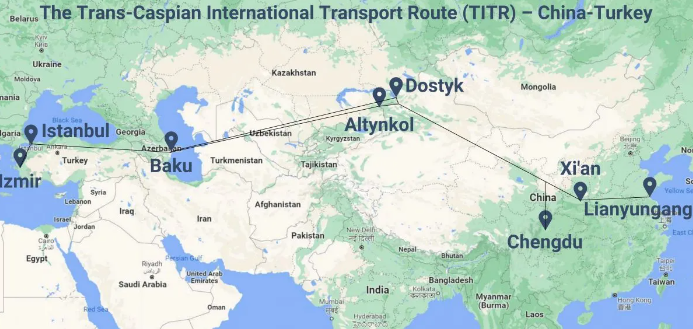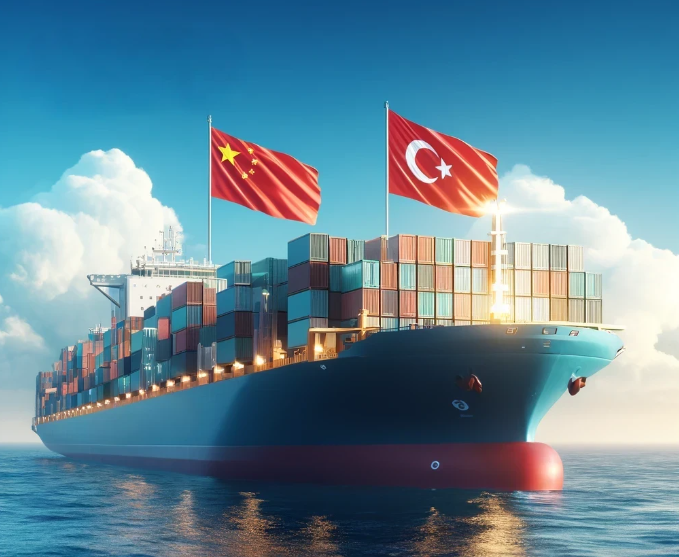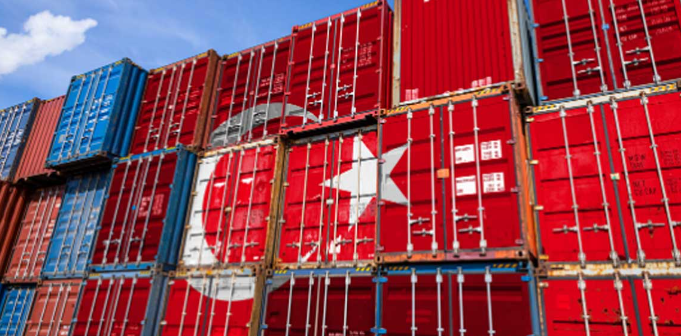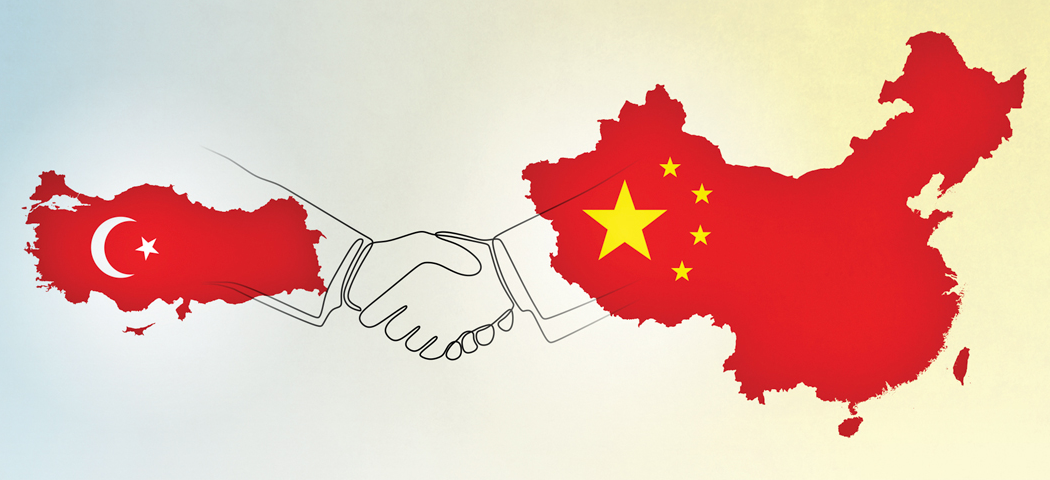Be your Logistics Department in China
Customized logistics solutions, your logistics expert in China
Customized logistics solutions, Shipping from China to the World
Tel:+8613424475220 Email:info@viputrans.com 
In the rapidly evolving global market, the trade relationship between China and Turkey has seen substantial growth from 2020 to 2024. As an international logistics salesperson, it's essential to understand the key developments, data, and future trends that define this trade relationship. This article aims to provide our customers with a comprehensive overview of the international logistics landscape, focusing on railway transportation data, import and export statistics, major products traded, and future cooperation opportunities.

Railway Transportation Data
The past four years have witnessed a significant expansion in the use of railway transportation between China and Turkey. The China-Europe Railway Express has been pivotal in this growth, extending its routes to Turkey and enhancing connectivity. The volume of goods transported by rail has consistently increased, with significant improvements in both speed and reliability. In 2020, the total number of freight trains running between China and Turkey was around 800, a figure that grew to over 1,200 by 2023. The primary commodities transported include electronics, machinery, textiles, and automotive parts.
Key Railway Stations and Routes
The China-Europe Railway Express has been instrumental in the development of the China-Turkey railway transportation plan. Key railway stations and routes facilitating trade between these two countries include:
Xi'an International Inland Port: Serving as a major logistics hub in China, Xi'an is the starting point for many freight trains heading towards Turkey.
Chongqing and Chengdu: These cities are pivotal in western China, contributing significantly to the export volume due to their strategic location and infrastructure.
Kars Railway Station: Located in eastern Turkey, Kars acts as a gateway for freight trains entering Turkey from China. It connects with the Baku-Tbilisi-Kars (BTK) railway line.
Istanbul and Ankara: As major economic centers in Turkey, these cities receive a substantial portion of goods transported by rail. Istanbul’s Halkalı Terminal and Ankara’s Kazlıçeşme Terminal are key destinations.
Train Schedules and Frequency
The frequency and scheduling of trains have been optimized to meet the growing demand for efficient logistics solutions. Recent data indicates the following trends in train schedules:
Increased Frequency: From 2020 to 2024, the number of trains running between China and Turkey increased significantly. In 2020, approximately 800 freight trains operated on this route annually. By 2023, this number had grown to over 1,200 trains per year, reflecting the rising trade volume.
Regular Schedules: Trains depart from major Chinese logistics hubs such as Xi'an, Chongqing, and Chengdu on a weekly basis, ensuring a steady flow of goods. These trains typically take around 15-20 days to reach key Turkish destinations, making rail transport a faster alternative to sea freight.
Dedicated Services: Specialized services such as temperature-controlled containers for perishable goods and high-security measures for valuable cargo have been introduced, catering to diverse customer needs.

Major Ports and Shipping Routes
Sea shipping remains a critical component of the logistics network between China and Turkey, handling a significant volume of trade. Key ports and shipping routes include:
Ports in China:
Shanghai: As one of the largest ports in the world, Shanghai handles a significant portion of China's exports to Turkey.
Shenzhen: A major hub for electronics and manufacturing goods, Shenzhen is crucial for trade with Turkey.
Ningbo-Zhoushan: Known for its extensive container handling capacity, this port plays a vital role in the export of various goods to Turkey.
Ports in Turkey:
Istanbul (Ambarli): Serving as Turkey's main gateway for container shipping, Istanbul is a key destination for Chinese goods.
Izmir (Alsancak): Located on the Aegean coast, Izmir handles a diverse range of imports from China.
Mersin: A strategic port on the Mediterranean coast, Mersin is important for trade routes connecting to the Middle East and Europe.

Import and Export Data
The trade volume between China and Turkey has shown robust growth. According to the latest data:
2020: Bilateral trade volume stood at approximately $25 billion.
2021: Trade volume increased to $28 billion, with significant contributions from machinery and electronics.
2022: Trade volume reached $31 billion, driven by the expansion of textile and automotive exports.
2023: The trade volume peaked at $35 billion, highlighting a diversified portfolio of traded goods.

China's exports to Turkey are diverse, catering to various industries. The main products exported from China to Turkey include:
Electronics: Smartphones, laptops, and electronic components form a significant portion of the exports.
Machinery and Equipment: Industrial machinery, construction equipment, and agricultural machinery.
Textiles: Fabrics, garments, and textile raw materials.
Automotive Parts: Engine components, tires, and other automotive accessories.
Household Goods: Furniture, home appliances, and kitchenware.
These products reflect the strong industrial and consumer demand in Turkey, which China efficiently meets through its robust manufacturing capabilities.
Future Trends
As we look ahead, several trends are likely to shape the future of China-Turkey trade and logistics:
Increased Use of Digital Technologies: Innovations in logistics technologies, such as AI, blockchain, and IoT, will enhance the efficiency and transparency of supply chains.
Sustainability Initiatives: Both countries are expected to focus on sustainable logistics practices, including the use of green energy and eco-friendly transportation methods.
Diversification of Trade Routes: In addition to railway, there will be a focus on developing sea and air routes to ensure a resilient logistics network.
International Logistics Cooperation
The collaboration between China and Turkey in the logistics sector will continue to grow, driven by mutual interests in expanding trade. Key areas of cooperation include:
Infrastructure Development: Joint investments in logistics hubs, railways, and ports to enhance capacity and efficiency.
Regulatory Alignment: Harmonizing customs procedures and trade regulations to facilitate smoother cross-border transactions.
Skill Development: Training programs and knowledge exchange to build expertise in advanced logistics and supply chain management.

The period from 2020 to 2024 has been transformative for China-Turkey trade relations, with significant advancements in international logistics, particularly in railway transportation. As we move forward, the emphasis on technology, sustainability, and cooperation will pave the way for even more robust trade ties. For our customers, staying informed about these developments and leveraging the opportunities they present will be crucial for thriving in the dynamic global market.
Shawn.Liao(Mr.) Phone/Wechat/Whatsapp/Skype: +8618926970495
E-MAIL:sales04@viputrans.com ;Our company has been engaged in international transport for a long time.
Copyright © 2003-2026 VIPU Supply Chain Logistics Co., Ltd. | All Rights Reserved
LOGISTICS | E-COMMERCIAL FULFILLMENT | ABOUT US | CASE | NEWS | VIDEO | CONTACT US
We will find the fastest or the cheapest way for your shipment. Please specify: where from, where to, what to ship.